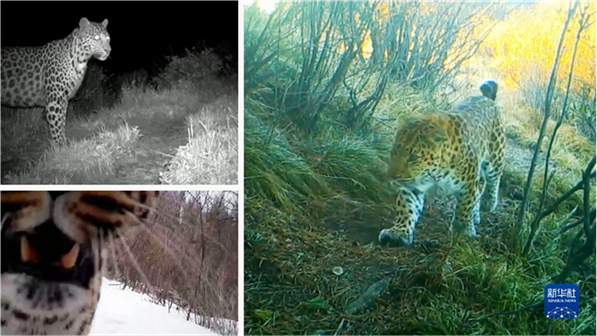SHIJIAZHUANG -- Wandering on snow, a North China Leopard quietly approached, gazed at the infrared camera and opened wide its mouth, exposing its sharp teeth.
These dramatic visuals were captured by the camera installed at the Tuoliang national nature reserve in North China's Hebei province. From November 2022 to February 2023, the species were captured more than 10 times by the cameras in the reserve.
This breed of leopard, also known as the Chinese Leopard, is under first-class national protection in China.

North China Leopards are captured by the camera installed at the Tuoliang national nature reserve in North China's Hebei province. [Photo/Xinhua]
In recent years, the endangered species has been repeatedly spotted in their traditional habitats in Hebei Province thanks to the conservation efforts in the region.
"The frequent appearance of the leopard indicates that the ecosystem is improving, with stable biodiversity," said Li Jianping, deputy director of the management center of the reserve.
Li went on to add that the reserve is now home to nearly 40 species of wild animals under China's first or second-class national protection, with wild boars, foxes, deer and hares more commonly seen.
"More trees and grass have led to increased wild animals, resulting in a more complete food chain," said Li, adding that the leopards now are having more prey.
Hebei Province, neighboring Beijing, is the only province in China with plateau, mountain, hill, plain, lake, seashore and desert landforms. The province has intensified efforts to control environmental pollution and promoted green and low-carbon transformation, with the ecological environment constantly improving and enriching biodiversity.
According to Tian Jianhui, the chief engineer of the provincial forestry and grassland bureau, the forest coverage in Taihang Mountains has risen from 11 percent in 1994 to 32 percent now, providing fine habitats for wild animals. He attributed this improvement to the afforestation efforts in recent years.
In Xiong'an New Area, the water quality of Baiyangdian, an important wetland system in north China and a resting, breeding and wintering site for migratory birds, has improved from Level V in 2017, when the Xiong'an New Area was inaugurated, to Level III at present. The number of wild bird species has risen by 46 to reach 252, with more fish species spotted in the wetland.
Last year, the Baer's pochard, which is a type of diving duck listed as a critically endangered species by the International Union for Conservation of Nature, was spotted in Baiyangdian, said Liu Xun, an official in charge of wildlife protection and wetland management at the provincial forestry and grassland bureau.
"While monitoring the lake, our camera for the first time captured an adult Baer's pochard with multiple chicks moving in and out of reed marshes," Liu said.
Liu Fengting, director of the bureau, said Hebei has 278 protected areas covering 14,034 square km, or 7.43 percent of the total land mass of the province.
From 2022 to 2025, Hebei will use conventional surveys, special surveys, infrared camera surveys, drone surveys and other methods to analyze wild animal species under state protection on land as well as the wild animal species in wetlands of the province.
The surveys will help figure out the distribution and population dynamics of these species, aiding biodiversity conservation in the province, according to the bureau.
(Source: China Daily)